-
Introduction and Historical Background
-
Chronology in the Book of Daniel
-
Chapter 1: Keeping Kosher in Exile
-
Chapter 2a: Does Anyone Know Nebuchadnezzar's Dream?
-
Chapter 2b: The Statue Has Feet of Clay
-
Chapter 3:1-30: The Colossus
-
Chapter 3:31, Chapter 4: Nebuchadnezzar's Madness
-
Chapter 5: Belshazzar's Feast
-
Chapter 6: Daniel in the Pit of Lions
General Resources
Goals
The goal
is to familiarize the students with the politics, geography, and geopolitics of
the short rise and fall of the Babylonian Empire. For the book of Daniel, the
focus is less on how that rise affected the nation of Judea in the land of
Israel; we deal primarily with how it affected the Jews who were taken into
exile. Their two primary concerns were:
a) How
does one live outside of Israel?
b) When would the Babylonian domination end and the return to Zion begin?
Essential understandings
-
The demise of the Assyrian Empire (626-605 BCE) opened the geographical
pathway for the Babylonians to conquer north and east, including Israel.
The Arabian Desert was not passable; all travel went via the Tigris or the
Euphrates. To get to Israel from Mesopotamia, you have to go up and around.
-
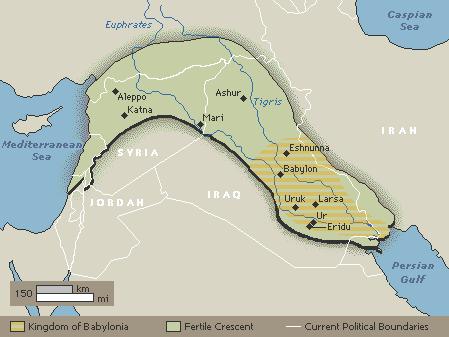 Egypt,
the other superpower, was trying to support Assyria because they knew that
Babylonia would be worse for them.
Egypt,
the other superpower, was trying to support Assyria because they knew that
Babylonia would be worse for them.
-
The Levant, i.e. Israel, Lebanon, Syria, was the political and actual
battleground between the two superpowers, Babylonia and Egypt.
-
Babylonia defeated Egypt and destroyed Assyria with the support of the Medes and
the Scythians. Only the Medes are important to the book of Daniel.
-
The Babylonians were ruled by a subgroup called the
כסדים,
or in English, Chaldeans.
-
Nebuchadnezzar II, while not the first king of the Neo-Babylonian Empire, was
the most dynamic. He destroyed Israel and the First Temple.
-
11 years before the destruction of the Judah and the First Temple,
Nebuchadnezzar II exiled many of the aristocracy and royal family to Babel, the
capital of Babylonia. Daniel and his three companions were among these
captives.
A Short History
The end of the nation of
Judah (which at that time included most of northern Israel) came at the hands of
the Neo-Babylonian Empire. The Babylonians, with help from the Medes and the
Scythians, had destroyed the Assyrian Empire. This opened up the road past the
fertile crescent into the Levant, i.e. Syria, Lebanon, and Israel. (The only way
to travel to the Levant was to stay between the Tigris and Euphrates rivers
before heading east around Carchamish.)
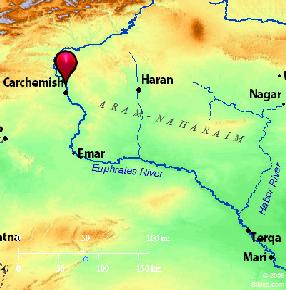 Ashurbanipal
was the last great King of the Assyrian empire, whose capital was Nineveh
(modern day Mosul) in northern Mesopotamia. Ashurbanipal died in 627 BCE, the
13th year of Yoshiyahu ben Amon, King of Judah. This was also the first year of
Yirmiyahu's prophecy, when he saw a nation coming to attack from the north. That
nation, as it turned out, was Babylonia, not Assyria. Following Ashurbanipal's
death, the crumbling Assyrian kingdom split between his two sons, Sin-shar-ishkin
and Ashuruballit II. Also following Ashurbanipal's death, Nabopolassar, the head
of the Chaldeans (כסדים), a Semitic tribe living in the marshes down by the
Persian Gulf who had claimed authority over the entire Babylonian kingdom,
ejected Sin-shar-ishkin from southern Mesopotamia. Nabopolassar made a treaty
with the Medes to conquer Northern Mesopotamia from the Assyrians. The Assyrian
capital of Nineveh fell in 612 BCE to the Medes, who didn't wait for the
Babylonians to show up. Nabopolassar took control of the city.
Ashurbanipal
was the last great King of the Assyrian empire, whose capital was Nineveh
(modern day Mosul) in northern Mesopotamia. Ashurbanipal died in 627 BCE, the
13th year of Yoshiyahu ben Amon, King of Judah. This was also the first year of
Yirmiyahu's prophecy, when he saw a nation coming to attack from the north. That
nation, as it turned out, was Babylonia, not Assyria. Following Ashurbanipal's
death, the crumbling Assyrian kingdom split between his two sons, Sin-shar-ishkin
and Ashuruballit II. Also following Ashurbanipal's death, Nabopolassar, the head
of the Chaldeans (כסדים), a Semitic tribe living in the marshes down by the
Persian Gulf who had claimed authority over the entire Babylonian kingdom,
ejected Sin-shar-ishkin from southern Mesopotamia. Nabopolassar made a treaty
with the Medes to conquer Northern Mesopotamia from the Assyrians. The Assyrian
capital of Nineveh fell in 612 BCE to the Medes, who didn't wait for the
Babylonians to show up. Nabopolassar took control of the city.
The remnants of the Assyrians under
Ashuruballit II retreated to Haran, in northern Syria, to make their last stand.
Egypt, under the rule of Pharaoh Necho II, sent troops to assist the Assyrians.
King Yoshiyahu tried to stop Necho and his army in 609 BCE, in Megiddo, and was
killed for his troubles. The Assyrians fell to the Babylonians at the battle of
Battle of Carchemish, and the Babylonian Empire began its uncontested rule.
After King Yoshiyahu was killed, the
national leaders (עם הארץ) appointed Yoshiyahu's son Yehoachaz as ruler. He was
not the oldest son; apparently he was selected because the leaders thought him
easy to control, and because he supported their pro-Babylonian, anti-Egyptian
posture. Pharaoh Necho was not amused, and deposed him after 3 MONTHS.
Yoshiyahu's son Yehoyakim was put on the
throne in 609-8. In 605, Nebuchadnezzar managed to force Egypt back into her own
territory as well. After that campaign, Nebuchadnezzar returned to Babylon,
having heard that his father Nebopolassar had died, and assumed the throne. This
turn of world events is referred to by Yirmiyahu in chapter 46:. אֲשֶׁר הָיָה דְבַר-יְהוָה אֶל-יִרְמְיָהוּ
הַנָּבִיא עַל-הַגּוֹיִם לְמִצְרַיִם עַל-חֵיל פַּרְעֹה נְכוֹ מֶלֶךְ מִצְרַיִם
אֲשֶׁר-הָיָה עַל-נְהַר-פְּרָת בְּכַרְכְּמִשׁ אֲשֶׁר הִכָּה נְבוּכַדְרֶאצַּר
מֶלֶךְ בָּבֶל בִּשְׁנַת הָרְבִיעִית לִיהוֹיָקִים בֶּן-יֹאשִׁיָּהוּ מֶלֶךְ
יְהוּדָה:
Yirmiyahu 25:1 (בשנה הרביעית
ליהויקים בן יאשיהו מלך יהודה היא השנה הראשונה לנבוכדנאצר)
matches the Babylonian Chronicles, dating Nebuchadnezzar II’s ascension to the
throne as 605 BCE. Apparently יהויקים
submitted to Babylon for three years—until the seventh year of his rule—and then
rebelled, falling back under Egyptian control, as it says in II Kings 24: בְּיָמָיו עָלָה
נְבֻכַדְנֶאצַּר מֶלֶךְ בָּבֶל וַיְהִי-לוֹ יְהוֹיָקִים עֶבֶד שָׁלֹשׁ שָׁנִים
וַיָּשָׁב וַיִּמְרָד-בּוֹ.
That rebellion lasted for three years, until Nebuchadnezzar returned. Yehoyakim
died, and in 3023 the Judeans were exiled, as Yirmiyahu reports in chapter 52:
זֶה הָעָם אֲשֶׁר הֶגְלָה נְבוּכַדְרֶאצַּר בִּשְׁנַת-שֶׁבַע
יְהוּדִים שְׁלֹשֶׁת אֲלָפִים וְעֶשְׂרִים וּשְׁלֹשָׁה.
Yehoyachin took over for his father
יהויקים, but lasted only three months until Nebuchadnezzar II had him deposed
and replaced him on the throne with his uncle, Matanya (Yoshiyahu's son).
Matanya was renamed Tzidkiyahu under the direction of Jeremiah the prophet. At
some point Tzidkiyahu rebelled against Nebuchadnezzar II as well. Jerusalem was
besieged in Tzidkiyahu's 9th year; during his 11th year (587/586), the kingdom
of Yehuda and the Beit HaMikdash were destroyed.
Goals
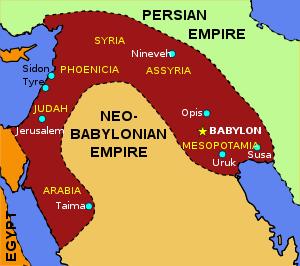 The
goal is to place the events of this book in the correct historical context,
which includes an understanding of which kings or empires were in power at those
points in time.
The
goal is to place the events of this book in the correct historical context,
which includes an understanding of which kings or empires were in power at those
points in time.
Essential understandings
-
• Daniel and his
friends are taken into exile, along with the aristocrats and members of the
royalty, shortly after Nebuchadnezzar II's first siege of Jerusalem and his
plundering of the Temple. The siege begins
בִּשְׁנַת שָׁלוֹשׁ לְמַלְכוּת יְהוֹיָקִים מֶלֶךְ-יְהוּדָה
בָּא נְבוּכַדְנֶאצַּר מֶלֶךְ-בָּבֶל יְרוּשָׁלִַם וַיָּצַר עָלֶיהָ. The
initial dating, בִּשְׁנַת שָׁלוֹשׁ, is difficult since Nebuchadnezzar
II assumes the throne in יְהוֹיָקִים's 4th year, according to Yirmiyahu
chapter 25. See commentaries. However, the two most likely
solutions are:
-
a. The siege
began right before Nebuchadnezzar II was king in 606 BCE, but the
plundering took place afterwards;
-
b. The "third year" means the third year of ְיהוֹיָקִים's
independent rule, after he rebelled against his Babylonian overlord. That
would be during his 11th year, in 597 BCE.
-
Young royals of
conquered states were often exiled and raised in the palace of the conqueror to
make them loyal. They could then be sent back to their homes to govern, while
retaining their loyalty to the conqueror.
-
The dating in Chapter
2 is difficult, since Daniel and his companion's scribal training took three
years. See commentaries for solutions.
-
The Book of Daniel
mentions three Babylonian kings:
-
Nebuchadnezzar
represents the beginning of the Empire. The book ignores his father
Nebopolassar since he had no direct affect on Israel. Tanach refers to
Nebuchadnezzar's son, Evil-Merodach (who freed Yehoyachin from prison), but
our book ignores him, since it jumps to the final native Babylonian king,
Balthazar.
-
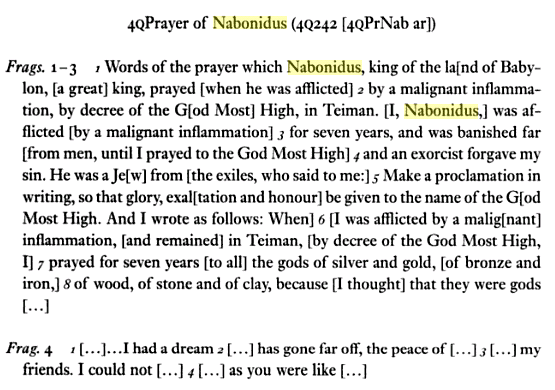 Balthazar.
Non-biblical sources show that Balthazar was actually a regent, set up by his
father Nabonides when the latter took a ten-year vacation in the Arabian oasis
of Tema. Tanach never mentions Nabonides; however, he was known to non-biblical
Jewish histories, as is evident from the Dead Sea Scroll 4Q Prayer Of Nabonides
[4QPrNab ar]. When the Book of Daniel refers to Balthazar as "the son
of Nebuchadnezzar," it does not mean he is his actual son, merely that he is a
successor. Note that both Yoshiyahu and Chizkiyahu are called "ben David," and
Zerubavel was called "ben She'altiel," even though She'altiel was his
grandfather. Also, make sure the students don't confuse Balthazar with Daniel's
Babylonian name, Baltethazar.
Balthazar.
Non-biblical sources show that Balthazar was actually a regent, set up by his
father Nabonides when the latter took a ten-year vacation in the Arabian oasis
of Tema. Tanach never mentions Nabonides; however, he was known to non-biblical
Jewish histories, as is evident from the Dead Sea Scroll 4Q Prayer Of Nabonides
[4QPrNab ar]. When the Book of Daniel refers to Balthazar as "the son
of Nebuchadnezzar," it does not mean he is his actual son, merely that he is a
successor. Note that both Yoshiyahu and Chizkiyahu are called "ben David," and
Zerubavel was called "ben She'altiel," even though She'altiel was his
grandfather. Also, make sure the students don't confuse Balthazar with Daniel's
Babylonian name, Baltethazar.
-
Darius the Mede
was apparently set up by the Medians and Babylonians in an attempt to prop up
the Babylonian empire in the face of the oncoming Persian empire under Cyrus the
Great. It didn't work. Darius the Mede's father
אֲחַשְׁוֵרוֹשׁ is not the אֲחַשְׁוֵרוֹשׁ of the Esther story.
-
The book of Daniel also mentions Cyrus the Great; however, only the final
apocalypse in chapters 10-12 takes place during Cyrus' time, and this material
is not in our syllabus.
-
Nebuchadnezzar rules from 605 BCE. Balthazar rules until near the end of the
Babylonian empire, in 539 BCE. Our book ignores all the kings in between,
although their existence may be hinted at in chapter 2 (to be discussed later).
-
In Darius the Mede’s first (and perhaps only) year of rule, 540/539, Daniel is
beginning to worry (in Chapter 9) why the end of the exile has not come, and why
the Babylonian empire is being propped up by a Mede. In Chapter 10, in the
third year of Cyrus the great, Daniel is sure the exile should be over, causing
him to receive the final apocalypse, which is not on the curriculum.
The Seventy Years
Jeremiah sends a letter to the exiles predicting 70 years of exile. The count
begins from the rise of the Babylonian empire; according to the Jewish view,
this is the first year of Nebuchadnezzar in 605 BCE. Chapter 25 says:
הַדָּבָר אֲשֶׁר-הָיָה עַל-יִרְמְיָהוּ עַל-כָּל-עַם יְהוּדָה
בַּשָּנָה הָרְבִעִית לִיהוֹיָקִים בֶּן-יֹאשִׁיָּהוּ מֶלֶךְ יְהוּדָה הִיא
הַשָּנָה הָרִאשֹׁנִית לִנְבוּכַדְרֶאצַּר מֶלֶךְ בָּבֶל אֲשֶׁר דִּבֶּר
יִרְמְיָהוּ הַנָּבִיא עַל-כָּל-עַם יְהוּדָה וְאֶל כָּל-יֹשְׁבֵי יְרוּשָׁלִַם
לֵאמֹר...וְהַאֲבַדְתִּי מֵהֶם קוֹל שָׂשׂוֹן וְקוֹל שִׂמְחָה קוֹל חָתָן וְקוֹל
כַּלָּה קוֹל רֵחַיִם וְאוֹר נֵר וְהָיְתָה כָּל-הָאָרֶץ הַזֹּאת לְחָרְבָּה
לְשַׁמָּה וְעָבְדוּ הַגּוֹיִם הָאֵלֶּה אֶת-מֶלֶךְ בָּבֶל שִׁבְעִים שָׁנָה וְהָיָה כִמְלֹאות שִׁבְעִים שָׁנָה אֶפְקֹד עַל-מֶלֶךְ-בָּבֶל וְעַל-הַגּוֹי
הַהוּא נְאֻם-יְהוָה אֶת-עֲוֹנָם וְעַל-אֶרֶץ כַּשְׂדִּים וְשַׂמְתִּי אֹתוֹ
לְשִׁמְמוֹת עוֹלָם
Chapter 29 contains the letter Jeremiah sent to the exiles
ְאֵלֶּה דִּבְרֵי הַסֵּפֶר אֲשֶׁר שָׁלַח יִרְמְיָה הַנָּבִיא
מִירוּשָׁלִָם אֶל-יֶתֶר זִקְנֵי הַגּוֹלָה וְאֶל-הַכֹּהֲנִים וְאֶל-הַנְּבִיאִים
וְאֶל-כָּל-הָעָם אֲשֶׁר הֶגְלָה נְבוּכַדְנֶאצַּר מִירוּשָׁלִַם בָּבֶלָה אַחֲרֵי
צֵאת יְכָנְיָה-הַמֶּלֶךְ וְהַגְּבִירָה וְהַסָּרִיסִים שָׂרֵי יְהוּדָה
וִירוּשָׁלִַם וְהֶחָרָשׁ וְהַמַּסְגֵּר מִירוּשָׁלִָם...כִּי-כֹה אָמַר יְהוָה
כִּי לְפִי מְלֹאת לְבָבֶל שִׁבְעִים שָׁנָה אֶפְקֹד אֶתְכֶם וַהֲקִמֹתִי עֲלֵיכֶם
אֶת-דְּבָרִי הַטּוֹב לְהָשִׁיב אֶתְכֶם אֶל-הַמָּקוֹם הַזֶּה
This would bring the end of the Babylonian exile to 536 BCE, the third year of
Cyrus' rule, which is why Daniel is so distraught in Chapter 10 (not a part of
the curriculum).
בִּשְׁנַת שָׁלוֹשׁ לְכוֹרֶשׁ מֶלֶךְ פָּרַס דָּבָר נִגְלָה
לְדָנִיֵּאל אֲשֶׁר-נִקְרָא שְׁמוֹ בֵּלְטְאשַׁצַּר וֶאֱמֶת הַדָּבָר וְצָבָא
גָדוֹל וּבִין אֶת-הַדָּבָר וּבִינָה לוֹ בַּמַּרְאֶה בַּיָּמִים הָהֵם אֲנִי
דָנִיֵּאל הָיִיתִי מִתְאַבֵּל שְׁלֹשָׁה שָׁבֻעִים יָמִים לֶחֶם חֲמֻדוֹת לֹא
אָכַלְתִּי וּבָשָׂר וָיַיִן לֹא-בָא אֶל-פִּי וְסוֹךְ לֹא-סָכְתִּי עַד-מְלֹאת
שְׁלֹשֶׁת שָׁבֻעִים יָמִים
However, three years earlier, in the first year of Darius the Mede, Daniel is
starting to worry about the end of the exile. Because the Babylonian Kingdom
was apparently being propped up by a Median king, Daniel may be worried about
this possibly interfering with Yirmiyahu's prophecy.
בִּשְׁנַת אַחַת לְדָרְיָוֶשׁ בֶּן-אֲחַשְׁוֵרוֹשׁ מִזֶּרַע מָדָי אֲשֶׁר הָמְלַךְ
עַל מַלְכוּת כַּשְׂדִּים בִּשְׁנַת אַחַת לְמָלְכוֹ אֲנִי דָּנִיֵּאל בִּינֹתִי
בַּסְּפָרִים מִסְפַּר הַשָּנִים אֲשֶׁר הָיָה דְבַר-יְהוָה אֶל-יִרְמְיָה
הַנָּבִיא לְמַלֹּאות לְחָרְבוֹת יְרוּשָׁלִַם שִׁבְעִים שָׁנָה וָאֶתְּנָה
אֶת-פָּנַי אֶל-אֲדנָי הָאֱלֹהִים לְבַקֵּשׁ תְּפִלָּה וְתַחֲנוּנִים בְּצוֹם
וְשַׂק וָאֵפֶר:
Many people assume that the 70-year
timeframe begins from the destruction of the Temple in 587/6, and in fact, the
prophet Zecharya does seem to indicate a 70-year period from destruction to
rebuilding. (The rebuilding of the second temple occurred during the fourth year
of Darius I the Persian, which would be in 518 BCE. That is 70 years after the
city and the Temple's destruction.) However, this is not the 70-year cycle to
which Jeremiah and Daniel refer.
A Graphical Timeline
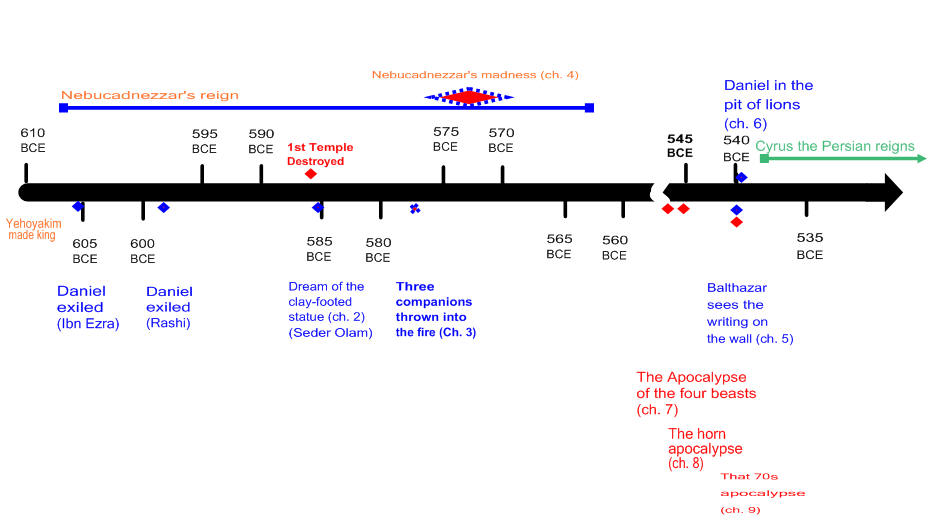
Enduring Understandings
-
One of the book’s primary goals is to deal with the question, "How Does a
Jew Live in Exile?"
-
Daniel and his three companions are probably members of the royal family.
Young royals of conquered states were often exiled and raised in the palace
of the conqueror to make them loyal. They could be then sent back to their
home countries to govern, while retaining loyalty to the conqueror.
-
The Book of Daniel is written so as to deliberately recall the Joseph
narratives in Bereishit.
-
Scribes were considered to hold a high-level job, requiring knowledge of
many languages and forms of writing, including cuneiform.
-
Kashrut is an issue; but is the primary problem Kashrut or idol worship?
How far is Daniel willing to go to avoid eating from the king's pat-bag and
drinking his wine?
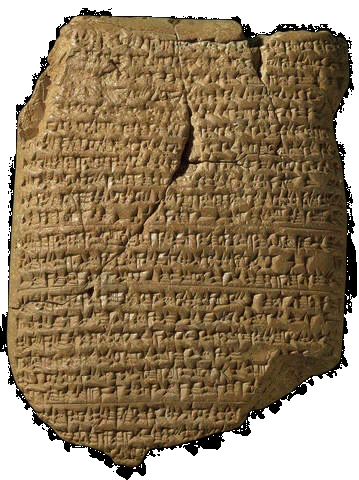 General
Knowledge:
General
Knowledge:
-
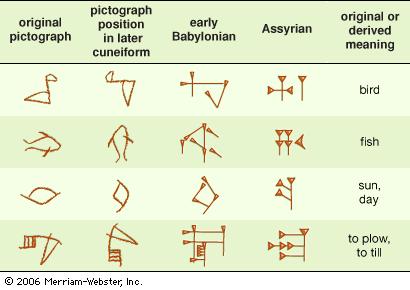 Eretz Shinar (Sumeria)
Eretz Shinar (Sumeria)
-
Saris
-
Pat-bag
-
Cuneiform
The Joseph/Daniel Connection
The following are the thematic similarities between the Joseph narrative in
Bereishit 39ff and the Book of Daniel. These include:
-
being
brought against one’s will into exile;
-
moving up the ranks of power, finally achieving the rank of second in
command (chapter 2, 5, and 6);
-
recognition of God's hand in one’s success;
-
the
ability to interpret dreams; and
-
taking, or being given, a foreign name.
Besides
these thematic connections, there is an explicit textual connection. Here is a
sampling of several of these textual links. It is probably not exhaustive. It
might be an interesting project to see how many parallels the students can
identify.
|
בראשית/יוסף |
דניאל |
|
מז:ב וּמִקְצֵה אֶחָיו לָקַח חֲמִשָּה אֲנָשִׁים וַיַּצִּגֵם
לִפְנֵי פַרְעֹה |
א:ה
וּמִקְצָתָם יַעַמְדוּ לִפְנֵי הַמֶּלֶךְ |
|
מא:מה וַיִּקְרָא פַרְעֹה שֵׁם-יוֹסֵף צָפְנַת פַּעְנֵחַ |
א:ז
וַיָּשֶׂם לָהֶם שַׂר הַסָּרִיסִים שֵׁמוֹת וַיָּשֶׂם לְדָנִיֵּאל
בֵּלְטְשַׁאצַּר וְלַחֲנַנְיָה שַׁדְרַךְ וּלְמִישָׁאֵל מֵישַׁךְ
וְלַעֲזַרְיָה עֲבֵד נְגוֹ |
|
מ:ו
וַיָּבֹא אֲלֵיהֶם יוֹסֵף בַּבֹּקֶר וַיַּרְא אֹתָם וְהִנָּם זֹעֲפִים: |
א:י
אֲשֶׁר לָמָּה יִרְאֶה אֶת-פְּנֵיכֶם זֹעֲפִים |
|
מא:ב וְהִנֵּה מִן-הַיְאֹר עֹלֹת שֶׁבַע פָּרוֹת יְפוֹת מַרְאֶה וּבְרִיאֹת
בָּשָׂר |
א:טו
נִרְאָה מַרְאֵיהֶם טוֹב וּבְרִיאֵי בָּשָׂר |
|
מ:ב
וַיִּקְצֹף פַּרְעֹה עַל שְׁנֵי סָרִיסָיו |
ב:יב כָּל-קֳבֵל דְּנָה מַלְכָּא בְּנַס וּקְצַף שַׂגִּיא |
|
מא:ח
וַיְהִי בַבֹּקֶר וַתִּפָּעֶם רוּחוֹ וַיִּשְׁלַח וַיִּקְרָא
אֶת-כָּל-חַרְטֻמֵּי מִצְרַיִם וְאֶת-כָּל-חֲכָמֶיהָ וַיְסַפֵּר פַּרְעֹה
לָהֶם אֶת-חֲלֹמוֹ וְאֵין-פּוֹתֵר אוֹתָם לְפַרְעֹה |
ב:א-ב
וּבִשְׁנַת שְׁתַּיִם לְמַלְכוּת נְבֻכַדְנֶצַּר חָלַם נְבֻכַדְנֶצַּר
חֲלֹמוֹת וַתִּתְפָּעֶם רוּחוֹ וּשְׁנָתוֹ נִהְיְתָה עָלָיו וַיֹּאמֶר
הַמֶּלֶךְ לִקְרֹא לַחַרְטֻמִּים וְלָאַשָּפִים וְלַמְכַשְּפִים
וְלַכַּשְׂדִּים לְהַגִּיד לַמֶּלֶךְ חֲלֹמֹתָיו וַיָּבֹאוּ וַיַּעַמְדוּ
לִפְנֵי הַמֶּלֶךְ וַ |
|
לז:לו
לְפוֹטִיפַר סְרִיס פַּרְעֹה שַׂר הַטַּבָּחִים: |
ב:יד
לְאַרְיוֹךְ רַב-טַבָּחַיָּא דִּי
מַלְכָּא |
|
מא:יב-טו
וְשָׁם אִתָּנוּ נַעַר עִבְרִי עֶבֶד לְשַׂר
הַטַּבָּחִים וַנְּסַפֶּר-לוֹ וַיִּפְתָּר-לָנוּ אֶת-חֲלֹמֹתֵינוּ אִישׁ
כַּחֲלֹמוֹ פָּתָר וַיְהִי כַּאֲשֶׁר פָּתַר-לָנוּ כֵּן הָיָה אֹתִי
הֵשִׁיב עַל-כַּנִּי וְאֹתוֹ תָלָה וַיִּשְׁלַח פַּרְעֹה וַיִּקְרָא
אֶת-יוֹסֵף וַיְרִיצֻהוּ מִן-הַבּוֹר וַיְגַלַּח וַיְחַלֵּף
שִׂמְלֹתָיו וַיָּבֹא אֶל-פַּרְעֹה וַיֹּאמֶר פַּרְעֹה אֶל-יוֹסֵף
חֲלוֹם חָלַמְתִּי וּפֹתֵר אֵין אֹתוֹ וַאֲנִי שָׁמַעְתִּי עָלֶיךָ לֵאמֹר
תִּשְׁמַע חֲלוֹם לִפְתֹּר אֹתוֹ וַיַּעַן יוֹסֵף אֶת-פַּרְעֹה לֵאמֹר
בִּלְעָדָי אֱלֹהִים יַעֲנֶה אֶת-שְׁלוֹם פַּרְעֹה: |
ב:כה-כח
אֱדַיִן אַרְיוֹךְ בְּהִתְבְּהָלָה הַנְעֵל
לְדָנִיֵּאל קֳדָם מַלְכָּא וְכֵן אֲמַר-לֵהּ דִּי-הַשְׁכַּחַת גְּבַר
מִן-בְּנֵי גָלוּתָא דִּי יְהוּד דִּי פִשְׁרָא לְמַלְכָּא יְהוֹדַע עָנֵה
מַלְכָּא וְאָמַר לְדָנִיֵּאל דִּי שְׁמֵהּ בֵּלְטְשַׁאצַּר הַאִיתָיךְ
הַאִיתָךְ כָּהֵל לְהוֹדָעֻתַנִי חֶלְמָא דִי-חֲזֵית וּפִשְׁרֵהּ עָנֵה
דָנִיֵּאל קֳדָם מַלְכָּא וְאָמַר רָזָא דִּי-מַלְכָּא שָׁאֵל לָא
חַכִּימִין אָשְׁפִין חַרְטֻמִּין גָּזְרִין יָכְלִין לְהַחֲוָיָה
לְמַלְכָּא בְּרַם אִיתַי אֱלָהּ בִּשְׁמַיָּא גָּלֵא רָזִין וְהוֹדַע
לְמַלְכָּא נְבוּכַדְנֶצַּר מָה דִּי לֶהֱוֵא בְּאַחֲרִית יוֹמַיָּא
חֶלְמָךְ וְחֶזְוֵי רֵאשָׁךְ עַל-מִשְׁכְּבָךְ דְּנָה הוּא |
|
מט:א
וַיִּקְרָא יַעֲקֹב אֶל-בָּנָיו וַיֹּאמֶר הֵאָסְפוּ וְאַגִּידָה לָכֶם אֵת
אֲשֶׁר-יִקְרָא אֶתְכֶם בְּאַחֲרִית הַיָּמִים: |
ב:כח
מָה דִּי לֶהֱוֵא בְּאַחֲרִית יוֹמַיָּא
|
|
מ:ט-יב
וַיְסַפֵּר ...אֶת-חֲלֹמוֹ לְיוֹסֵף...וַיֹּאמֶר
לוֹ יוֹסֵף זֶה פִּתְרֹנוֹ |
ב:לז
דְּנָה חֶלְמָא וּפִשְׁרֵהּ נֵאמַר קֳדָם-מַלְכָּא: |
|
מה:כו
וַיַּגִּדוּ לוֹ לֵאמֹר עוֹד יוֹסֵף חַי וְכִי-הוּא
מֹשֵׁל בְּכָל-אֶרֶץ מִצְרָיִם |
ב:מח
אֱדַיִן מַלְכָּא לְדָנִיֵּאל רַבִּי וּמַתְּנָן
רַבְרְבָן שַׂגִּיאָן יְהַב-לֵהּ וְהַשְׁלְטֵהּ עַל כָּל-מְדִינַת בָּבֶל
וְרַב-סִגְנִין עַל כָּל-חַכִּימֵי בָבֶל: |
|
מא לח
וַיֹּאמֶר פַּרְעֹה אֶל-עֲבָדָיו הֲנִמְצָא כָזֶה אִישׁ אֲשֶׁר רוּחַ
אֱלֹהִים בּוֹ: |
ד:ה
וְעַד אָחֳרֵין עַל קָדָמַי דָּנִיֵּאל דִּי-שְׁמֵהּ
בֵּלְטְשַׁאצַּר כְּשֻׁם אֱלָהִי וְדִי רוּחַ-אֱלָהִין קַדִּישִׁין בֵּהּ
וְחֶלְמָא קָדָמוֹהִי אַמְרֵת: |
|
מ:כ
וַיְהִי בַּיּוֹם הַשְּלִישִׁי יוֹם הֻלֶּדֶת אֶת-פַּרְעֹה וַיַּעַשׂ
מִשְׁתֶּה לְכָל-עֲבָדָיו
|
ה:א
בֵּלְשַׁאצַּר מַלְכָּא עֲבַד לְחֶם רַב לְרַבְרְבָנוֹהִי אֲלַף
|
|
מא:מב-מג
וַיָּסַר פַּרְעֹה אֶת-טַבַּעְתּוֹ מֵעַל יָדוֹ
וַיִּתֵּן אֹתָהּ עַל-יַד יוֹסֵף וַיַּלְבֵּשׁ אֹתוֹ בִּגְדֵי-שֵׁשׁ
וַיָּשֶׂם רְבִד הַזָּהָב עַל-צַוָּארוֹ וַיַּרְכֵּב אֹתוֹ בְּמִרְכֶּבֶת
הַמִּשְׁנֶה אֲשֶׁר-לוֹ וַיִּקְרְאוּ לְפָנָיו אַבְרֵךְ וְנָתוֹן אֹתוֹ עַל
כָּל-אֶרֶץ מִצְרָיִם: |
ה:כט
בֵּאדַיִן אֲמַר בֵּלְשַׁאצַּר וְהַלְבִּשׁוּ
לְדָנִיֵּאל אַרְגְּוָנָא וְהַמְנִיכָא דִי-דַהֲבָא עַל-צַוְּארֵהּ
וְהַכְרִזוּ עֲלוֹהִי דִּי-לֶהֱוֵא שַׁלִּיט תַּלְתָּא בְּמַלְכוּתָא: |
The Esther/Daniel Connection
Our book also contains parallels with the Book of Esther, primarily thematic but
some textual. In some cases, Rabbinic aggadah heightens these connections. One
example is when the aggadah identifies the vessels used in Achashveirosh's party
as taken from the Temple, which is how our book begins
וַיִּתֵּן אֲדנָי בְּיָדוֹ אֶת-יְהוֹיָקִים מֶלֶךְ-יְהוּדָה
וּמִקְצָת כְּלֵי בֵית-הָאֱלֹהִים וַיְבִיאֵם אֶרֶץ-שִׁנְעָר בֵּית אֱלֹהָיו
וְאֶת-הַכֵּלִים הֵבִיא בֵּית אוֹצַר אֱלֹהָיו
אסתר רבה (וילנא) פרשה ב
וכלים מכלים שונים, הביא כליו וכלי עילם ונמצאו שלו יפין משל עילם, הביא
כליו וכלי בית המקדש ונמצאו נאים ויפין מכליו, למטרונה שהיתה לה שפחה יפה כל
זמן שמבטת בשפחתה היו פניה משתנות, כך כל זמן שהיו כלי בית המקדש מביטין בכליו היו
משתנין כליו ונעשין כעופרת, ר' תחליפא בר בר חנה אמר כלים שצורתן נשתנים לימים קלים,
א"ר שמואל בר רב נחמן כלים מכלים למשתמשין בהם והם שונין בקלקלה, מי גרם לבלשצר
שתתקעקע ביצתו מן העולם לא ע"י שנשתמש בכלי בית המקדש הה"ד (דניאל ה') בלשאצר
אמר בטעם חמרא להיתיה למאני דהבא וכספא די הנפק נבוכדנצר וגו', מה כתיב ביה בליליא
קטיל בלשאצר מלכא כשדאה.
Note also
the affect of Yosef and Esther on their keepers:
|
וַתִּלָּקַח אֶסְתֵּר אֶל-בֵּית
הַמֶּלֶךְ אֶל-יַד הֵגַי שֹׁמֵר הַנָּשִׁים וַתִּיטַב הַנַּעֲרָה בְעֵינָיו
וַתִּשָּא חֶסֶד לְפָנָיו |
וַיְבַקֵּשׁ מִשַּר הַסָּרִיסִים
אֲשֶׁר לֹא יִתְגָּאָל וַיִּתֵּן הָאֱלֹהִים אֶת-דָּנִיֵּאל לְחֶסֶד
וּלְרַחֲמִים לִפְנֵי שַׂר הַסָּרִיסִים: |
Miracles
or Science
Ibn Ezra brings up a good point. Daniel and his three companions enjoyed good
health, despite their diet; was this an obvious result of God's helping hand?
Or was their vegetarianism really just good healthy eating, apparently not well
known in Babel at the time?
א:טו
וּמִקְצָת יָמִים עֲשָׂרָה נִרְאָה מַרְאֵיהֶם טוֹב וּבְרִיאֵי בָּשָׂר
מִן-כָּל-הַיְלָדִים הָאֹכְלִים אֵת פַּת-בַּג הַמֶּלֶךְ
ראב"ע:
ויאמר הגאון: זה היה נס גדול; ואין צורך! כי היו אוכלים אורז,
הוא הנקרא בלשון ערבי 'ארוז', והוא נכבד מאד וערב מן החטה, ועושה דם טהור, והוא
מאכל אנשי הודו ואין להם חטה, ונעשו ממנו תבשילין. וזה האורז ישגא מאד כאשר יבושל
בחלב, והכלל - כי המעט ממנו משביע, והוא כבד במשקליו, וגרגריו דקין מאד, ואינן
עגולין, ותולדתו חמה ולחה...והנה האורז והאפונים הם "זרעונים" (להלן,טז) ומבריאים
את הבשר. ועוד, כי כל מאכל שהוא תאוה לנפש יותר יועיל ממאכל שאין הנפש אוהבת אותו
אע"פ שיהיה חם ולח בתולדת החיים; והנה אלה היו אוכלין דבר שתתאוה נפשם, והיה מועיל
להם.
 Ibn
Ezra cites the Gaon (הגאון),
which is Rav Saadia Gaon. The parshan in the Mikra'ot Gedolot listed as "Rav
Saadia Gaon" (רס"ג)
is not Rav Saadia Gaon.
Ibn
Ezra cites the Gaon (הגאון),
which is Rav Saadia Gaon. The parshan in the Mikra'ot Gedolot listed as "Rav
Saadia Gaon" (רס"ג)
is not Rav Saadia Gaon.
What does
it take to be a court scribe?
Apparently, besides intelligence, it takes a strong bladder.
א:ג-ד
וַיֹּאמֶר הַמֶּלֶךְ לְאַשְׁפְּנַז רַב סָרִיסָיו לְהָבִיא מִבְּנֵי יִשְׂרָאֵל
וּמִזֶּרַע הַמְּלוּכָה וּמִן-הַפַּרְתְּמִים: יְלָדִים אֲשֶׁר אֵין-בָּהֶם
כָּל-מוּם וְטוֹבֵי מַרְאֶה וּמַשְׂכִּלִים בְּכָל-חָכְמָה וְיֹדְעֵי דַעַת
וּמְבִינֵי מַדָּע וַאֲשֶׁר כֹּחַ בָּהֶם לַעֲמֹד בְּהֵיכַל הַמֶּלֶךְ וּלְלַמְּדָם
סֵפֶר וּלְשׁוֹן כַּשְׂדִּים:
רש"י על אתר: ואשר
כח בהם - פירשו רבותינו זכרונם לברכה, שיהיו אונסין עצמן מן השחוק ומן השיחה
ומן השינה מפני אימת מלכות, ושמעמידים עצמן כשנצרכים לנקביהם.
From an
Obituary for President Hafez Assad, in the New York Times, Sunday, June 11, 2000
"When Henry A. Kissinger arrived in 1973, becoming
the first American secretary of state to visit Syria
in 20 years, their initial meeting lasted 6 hours
and 30 minutes...The lengthy exchanges got to the
point that one task of the American ambassador was
to brief visiting dignitaries before any meeting
with President Assad to pace themselves on the
constant offerings of coffee, tea and lemonade lest
they bruise protocol by interrupting the Syrian
leader to ask for a bathroom break. ''We dubbed
it bladder diplomacy,'' said Edward P. Djerejian,
the American ambassador from 1988 to 1991."
(Emphasis, mine.)
חכמה, בינה, דעת.
All three elements are found in the requirements for the position of scribe:
וּמַשְׂכִּלִים בְּכָל-חָכְמָה וְיֹדְעֵי
דַעַת וּמְבִינֵי מַדָּע. It
is not clear, however, what all of these three things are. Compare Ibn
Ezra with other commentators.
Chapter Essentials
-
Nebuchadnezzar does NOT REMEMBER what his dream was! He's not a sadist in
asking what he dreamed, although his unreasonable demand is nonetheless an
indication of his despotism.
-
The advisors/magicians DO NOT UNDERSTAND AT FIRST that he does not remember
the dream.
-
Nebuchadnezzar seems to NOT UNDERSTAND that the advisors/magicians do not
understand that he does not remember the dream; although it is possible that
he just doesn’t care. Either way, he accuses them of trying to "buy time,"
יָדַע אֲנָה דִּי עִדָּנָא אַנְתּוּן זָבְנִין.
In modern English, we would say that they were stalling; however, based on
the context, it seems to mean that they were stalling so that the
time-of-wrath could change to a time-of-ease, i.e., a time in which
Nebuchadnezzar won't kill them for not being able to tell him what he
dreamed.
-
They try the old and tired "if you get rid of us, you won't find anyone
better anyway" gambit. This REALLY makes him angry.
-
Verse 16 seems to imply that Daniel appears before the king to buy some
time:: ְדָנִיֵּאל עַל וּבְעָה מִן-מַלְכָּא דִּי זְמָן יִנְתִּן-לֵהּ
וּפִשְׁרָא לְהַחֲוָיָה לְמַלְכָּא. (Note that he is trying to buy some
time in the true sense here, hence the word זמן
rather than עדן.)
However, based on verse 25, it seems that Daniel is appearing before
Nebuchadnezzar for the first time:: אֱדַיִן אַרְיוֹךְ בְּהִתְבְּהָלָה הַנְעֵל לְדָנִיֵּאל קֳדָם מַלְכָּא
וְכֵן אֲמַר-לֵהּ דִּי-הַשְׁכַּחַת גְּבַר מִן-בְּנֵי גָלוּתָא דִּי יְהוּד
דִּי פִשְׁרָא לְמַלְכָּא יְהוֹדַע:
Perhaps in verse 16, the Chief Executioner, Arioch, forwarded Daniel's
request.
-
Just like Joseph, Daniel takes no credit for interpreting the dream, and
identifies God as the source of his ability.
Enduring Understandings
-
Aramaic was the Lingua Franca of the time. Remember that the Chaldeans
migrated from Aram into the southern reaches of Mesopotamia more than half a
century before the events in the Book of Daniel take place.
-
The death penalty was known euphemistically as "the word [that] went out
from the king.” Our מִלְּתָה מִנִּי אַזְדָּא and כָּל-קֳבֵל
דִּי חֲזֵיתוֹן דִּי אַזְדָּא מִנִּי מִלְּתָא matches Esther 1:19
אִם-עַל-הַמֶּלֶךְ טוֹב יֵצֵא דְבַר-מַלְכוּת מִלְּפָנָיו and 7:8הֲגַם לִכְבּוֹשׁ אֶת-הַמַּלְכָּה עִמִּי בַּבָּיִת הַדָּבָר יָצָא מִפִּי הַמֶּלֶךְ
וּפְנֵי הָמָן חָפו.
The familiarity of the phrase indicates that it was in common use.
-
Nebuchadnezzar was a tyrant, and somewhat unhinged.
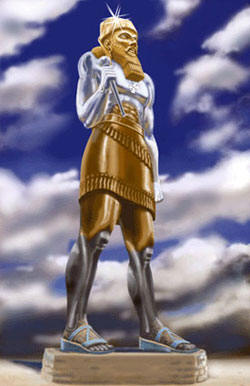
In this unit, Daniel grasps a way to save his life
and the life of his companions. God reveals to him both what
Nebuchadnezzar dreamed, and the meaning of this dream.
The dream was about a multi-media statue that predicts four (or five) stages of
power transfer. Most commentators feel that the four parts of the statue
represent empires, starting with Nebuchadnezzar representing the Babylonian
Empire. This would present a parallel to the four beasts of Chapter 7.
However, I believe that God was only showing Nebuchadnezzar his own "end of
days," i.e., the fate of the Babylonian empire. The four parts, therefore,
represent four kings: Nebuchadnezzar, perhaps followed by Evil-Merodoch,
Balthazar and Darius the Mede, who plays the part of the feet of clay.
Enduring understandings
-
Once again, Daniel has the gift of winning people over with reason. This
time, it is the Chief Executioner, Arioch.
-
The idea that God controls human political history, מְהַעְדֵּה מַלְכִין
וּמְהָקֵים מַלְכִין,
is an essential theme of the book. The message to its Jewish audience is:
God brought about the Babylonian Exile, and only God can end it. This is
equally applicable to the exiles apparently caused by Persia, Greece, Rome,
etc.
-
The end of an empire can come without warning, in the place you expect it
the least.
-
A
"Later Days" (בְּאַחֲרִית יוֹמַיָּא)
prophecy indicates a conclusion to some designated time. In Isaiah, there
is an obvious Messianic/End of Days setting, although it's not clear that is
always the case. For instance, Jacob’s End of Days prophecies (הֵאָסְפוּ וְאַגִּידָה לָכֶם אֵת
אֲשֶׁר-יִקְרָא אֶתְכֶם בְּאַחֲרִית הַיָּמִים)
seem to predict the return to the Promised Land from the Egyptian exile,
although perhaps it was meant to be Messianic. As I mentioned above, I
think that this prophecy only extends to the end of BABYLONIAN rule;
however, most commentators disagree.
General Knowledge: (Click to show and hide details)
-
Many Aramaic words can be understood
by employing the Aramaic/Hebrew Letter switch:
-
תִנְיָנוּת=שנית,
תְלִיתָאָה=שלישית,
תְבִירָה=שבירה
-
כִדְבָה=כזב,
כִדְנָה=כזה,
דְּחִיל=זחיל,
דַהֲבָא=זהב,
חֲדוֹהִי=חזהו,
דְרָעוֹהִי=זרעיו
-
גֲלִי(א)=גלה,
מְהֵימַן=נאמן,
הֵן=אִם
-
לֶהֱוֵא=להיות,
הֲוָת=היה,
חֵיוַת=חיה
-
פַרְזֶל=ברזל
-
קַיִט=קיץ
-
אַרְעָא=ארץ,
אֲרַע=ארץ (במובן שפלות),
מְרָעַע=מרצץ
-
Some important Aramaic words to
memorize:
-
בעה
-
אזל
-
בֵּאדַיִן=אז,
אחרי כן
-
עבד=עשה
-
פשר
-
יציב, קשט
-
דת ((Persian
-
קדם
-
איתי=יש
-
נפק
-
קטל
-
עדן
-
יהב=נתן
-
על=בא
-
חזה
-
שכח=מצא
-
דִּי=של, אשר לְ
-
Many Aramaic words have the
ה and נ which in Hebrew are
either elided or assimilated as a Dagesh Chazak.
-
אַנְתּוּן=אתּם
-
אִנְדַּע=אדּע
-
תְהוֹדְעֻנַּנִי
-
The word גָּזְרִין
seems to mean exorcist, based on the Prayer of Nabonides, found among the
Sea Scrolls. See the circled word on line 4.
-
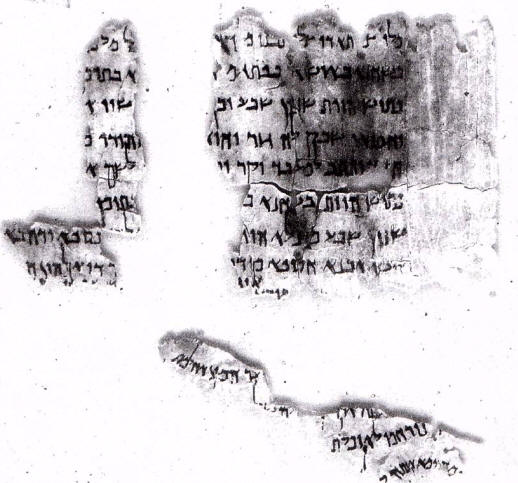
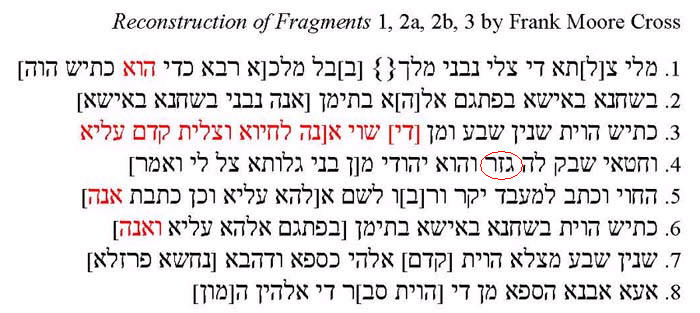
What does the statue represent?
| |
Positive ID |
My Opinion |
Rashi |
Ibn Ezra |
|
Head of Gold |
Nebuchadnezzar |
Nebuchadnezzar |
בבל |
בבל |
|
Chest and Arms of Silver |
A worse King/Kingdom |
Evil-Merodach |
מלכות מדי ופרס |
|
|
Belly and Thighs of Bronze |
King/Kingdom that rules the land. |
Nabonides?Balthazar? |
מלכות
אלכסנדרוס מוקדן |
מלכות יון, ומלכות רומא הוא מלכות יון |
|
Lower-legs (and feet?) of Iron |
King/Kingdom that crushes all beneath it |
Darius the Mede? Balthazar? |
מלכותם של רומיים |
מלכות ישמעאלים |
|
Feet (or toes?) of Iron and Clay |
Mixed with
בִּזְרַע אֲנָשָׁא
, commoners and aristocracy, who don't merge together |
Darius the Mede controlling Babel |
|
Crushing Stone |
God establishes King/Kingdom that will never be
destroyed and whose reign/dynasty will never be given to another. |
Zerubavel ben Shealtiel (Tzemach) |
מלכות מלך המשיח |
מלכות מלך המשיח |
Things to Ponder
In Chapter 3, Nebuchadnezzar builds a colossus, and gathers his entire
government and aristocracy to worship it. Daniel himself is not in the story,
but Daniel's three friends, Chananya, Mishael, and Azarya, are willing to
sacrifice their lives rather than bow down to the colossus. Nebuchadnezzar
throws them into a furnace, but they are not burned (as opposed to the people
Nebuchadnezzar commanded to super-heat the furnace, who died in the
conflagration). Nebuchadnezzar recognizes God as the only god who can redeem
people physically from certain death. He passes a law forbidding the slander of
the Jewish God, and recognizes God’s greatness. It is not clear why Daniel is
absent from this story, in light of Nebuchadnezzar’s invitation to all the
members of his government to attend.
Enduring Understandings
-
The Colossus may represent Nebuchadnezzar's god, Nebuchadnezzar himself, or
both. Note that the king's words are ambiguous when he says to Daniel's
three friends:
לֵאלָהַי לָא אִיתֵיכוֹן פָּלְחִין וּלְצֶלֶם דַּהֲבָא דִּי הֲקֵימֶת לָא
סָגְדִין
-
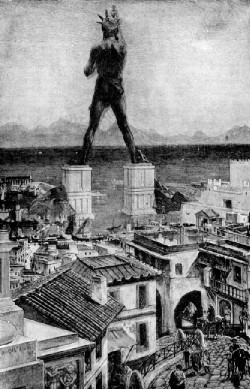 Nebuchadnezzar's
building of the colossus, and his requirement that all bow down to it on
pain of death, may be a reaction to Daniel's interpretation of his statue
with the feet of clay.
Nebuchadnezzar's
building of the colossus, and his requirement that all bow down to it on
pain of death, may be a reaction to Daniel's interpretation of his statue
with the feet of clay.
-
The anti-Semitism that shows up in this chapter may also be a result of the
previous chapter; specifically, the advancement of the Jews into places of
power in the government.
-
This story, and the Midrash regarding Abraham’s survival of the fires of
Nimrod and Ur Casdim, are clearly connected, with the Midrash based on our
story.
General Knowledge
-
Nebuchadnezzar's Colossus, standing 60 amot or 90 feet high, was not
the largest colossus of its time. The Colossus of Rhodes, built around 300
BCE, was over 100 feet high.
-
Mesopotamian cultures counted in base 60 (hence 60 seconds to the minute and
60 minutes in the hour), so the height of 60 amot is apt. The
width of the statue, at 6 amot, is problematic.
-
The Aramaic expression for לשון הרע
is
וַאֲכַלוּ קַרְצֵיהוֹן,
meaning "they ate the flesh of..."
Avraham in Ur
Casdim
Compare the Midrash of Avraham surviving the furnaces (Ur) of Nimrod with the
story of Chananel, Misha'el, and Azaryah refusing to bow down to the colossus.
In both cases, the trigger is a refusal to accept the national deity, and the
challenge is to the God of Abraham’s ability to save His faithful from the
fire. In both cases, the faithful do not say that God WILL save them, only that
God CAN, if he chooses.
בראשית רבה (וילנא) פרשת נח פרשה
לח
נסביה ומסריה לנמרוד, א"ל נסגוד לנורא, א"ל אברהם ונסגוד למיא דמטפין נורא, א"ל
נמרוד נסגוד למיא, א"ל אם כן נסגוד לעננא דטעין מיא, א"ל נסגוד לעננא א"ל אם כן נסגוד לרוחא דמבדר עננא, א"ל נסגוד לרוחא א"ל ונסגוד לבר אינשא דסביל רוחא, א"ל
מילין את משתעי אני איני משתחוה אלא לאור, הרי אני משליכך בתוכו, ויבא אלוה שאתה
משתחוה לו ויצילך הימנו, הוה תמן הרן קאים פלוג, אמר מה נפשך אם נצח אברהם אנא
אמר מן דאברהם אנא ואם נצח נמרוד אנא אמר דנמרוד אנא, כיון שירד אברהם לכבשן האש
וניצול, אמרין ליה דמאן את, אמר להון מן אברהם אנא, נטלוהו והשליכוהו לאור ונחמרו
בני מעיו, ויצא ומת על פני תרח אביו, הה"ד (שם /בראשית/ יא) וימת הרן על פני תרח
וגו'
דניאל ג:טו-יז
וְהֵן לָא תִסְגְּדוּן בַּהּ-שַׁעֲתָא תִתְרְמוֹן לְגוֹא-אַתּוּן נוּרָא יָקִדְתָּא
וּמַן-הוּא אֱלָהּ דִּי יְשֵׁיזְבִנְכוֹן מִן-יְדָי: עֲנוֹ
שַׁדְרַךְ מֵישַׁךְ וַעֲבֵד נְגוֹ וְאָמְרִין לְמַלְכָּא
נְבוּכַדְנֶצַּר לָא-חַשְׁחִין אֲנַחְנָא עַל-דְּנָה פִּתְגָם לַהֲתָבוּתָךְ: הֵן
אִיתַי אֱלָהַנָא דִּי-אֲנַחְנָא פָלְחִין יָכִל לְשֵׁיזָבוּתַנָא מִן-אַתּוּן
נוּרָא יָקִדְתָּא וּמִן-יְדָךְ מַלְכָּא יְשֵׁיזִב:
This unit
takes the form of a letter, written by Nebuchadnezzar to his kingdom,
recognizing God's supremacy. The letter begins and ends with this assertion.
|
Beginning |
אָתַיָּא וְתִמְהַיָּא דִּי עֲבַד עִמִּי אֱלָהָא עִלָּיאָ עִלָּאָה שְׁפַר
קָדָמַי לְהַחֲוָיָה: אָתוֹהִי כְּמָה רַבְרְבִין וְתִמְהוֹהִי כְּמָה
תַקִּיפִין מַלְכוּתֵהּ מַלְכוּת עָלַם וְשָׁלְטָנֵהּ עִם-דָּר וְדָר |
|
End |
אֲנָה נְבֻכַדְנֶצַּר מְשַׁבַּח וּמְרוֹמֵם וּמְהַדַּר לְמֶלֶךְ שְׁמַיָּא
דִּי כָל-מַעֲבָדוֹהִי קְשֹׁט וְאֹרְחָתֵהּ דִּין וְדִי מַהְלְכִין
בְּגֵוָה יָכִל לְהַשְׁפָּלָה |
The flow
of the story as related in the letter is as follows:
-
Nebuchadnezzar had a disturbing dream that he needs to interpret.
-
No
one could interpret the dream (at least he tells them the dream this time!),
until he called on Daniel.
-
He
related the dream to Daniel:
-
A
great tree provides sustenance and shelter to its animal population.
-
An angel orders the tree's destruction, though its roots remain, chained
to the grasses.
-
An angel orders that the remnants of the tree (transformed into a
person) descend into an animalistic state for seven years, until the
person recognizes God's authority.
-
Daniel was afraid to tell Nebuchadnezzar the meaning of the dream, but the
king persuaded him to do so. Daniel told him that the tree is
Nebuchadnezzar himself, and that he will descend into madness until he
recognizes God's majesty.
-
Nebuchadnezzar explains that 12 months after hearing Daniel’s
interpretation, in a fit of ego over his works, he took credit for all he
surveyed. At that moment God made him mad, and exiled him from his throne.
-
After a set time (probably the previously mentioned seven years),
Nebuchadnezzar recognized God's majesty over the whole world, and
Nebuchadnezzar returned to his throne.
Enduring Understandings
-
While it may seem that flesh-and-blood kings are all-powerful in this world,
and are solely responsible for the fate of their people, the kings rule only
at the will of God, and only succeed if they recognize that their power is
the direct result of the will of God.
General Knowledge
-
The concept of “chapters” in the Torah is of Christian origin, specifically
developed by
Stephen Langton,
the Archbishop of Canterbury. They are not always accurate. Jewish
divisions are done with breaks in the text. Here, the story begins with
such a break in chapter 3, verse 31. This is the correct beginning of the
story, which continues on through the end of chapter 4.
Classroom Questions:
For all of Nebuchadnezzar's violent and vindictive nature, his intemperance did
not extend to the decadence of wine and drink. Not so Belshazzar (not to be
confused with Daniel's Babylonian name Beltishazzar), the last Babylonian
king, and the second-to-last king of the 70-year Babylonian empire.
Belshazzar’s devotion to all indulgences sensual leads him not only to the
expected sins, but to the sin of contempt for the religion of others when,
drunk, he calls for the vessels taken from the destroyed Temple for the use of
the concubines and courtiers at the king's feast. This act of contempt brings
the writing on the wall, which predicts the doom of Belshazzar and the
Babylonian kingdom.
Historicity
The following section is from
Wikipedia
on Belshazzar:
Belshazzar
was the son of Nabonidus, who after ruling only three years,
went to the oasis of Tayma and devoted himself to the worship of
the moon god, Sin. He made Belshazzar co-regent in 553 B.C.,
leaving him in charge of Babylon's defense.
In the year
540 B.C. Nabonidus returned from Tayma, hoping to defend his
kingdom from the Persians who were planning to advance on
Babylon. In 538 B.C. Belshazzar was positioned in the city of
Babylon to hold the capital, while Nabonidus, marched his troops
north to meet Cyrus. On October 10, 539 B.C. Nabonidus
surrendered and fled from Cyrus. Two days later, October 12, 539
B.C., the Persian armies overthrew the city of Babylon.
The Book of Daniel never mentioned Nabonides; however, based on other books of
Tanach, the Kings of Babylon (from the biblical perspective) are:
Nebuchadnezzar, Evil-Merodach, Nabonidus, Belshazzar, and Darius the Mede.
Enduring Understandings
The Vessels of the Temple
The students should explore the similarities between Midrash regarding the party
that Achashveirosh held, where the Temple's utensils were used, and this
narrative which is the source for that Midrash. Why do the Rabbis want to tie
Megillat Esther to the Book of Daniel?
אסתר רבה (וילנא) פרשה ב
וכלים מכלים שונים, הביא כליו וכלי עילם ונמצאו שלו יפין משל עילם, הביא
כליו וכלי בהמ"ק =בית המקדש= ונמצאו נאים ויפין מכליו, למטרונה שהיתה לה שפחה יפה
כל זמן שמבטת בשפחתה היו פניה משתנות, כך כל זמן שהיו כלי בית המקדש מביטין בכליו
היו משתנין כליו ונעשין כעופרת


 General
Knowledge:
General
Knowledge:


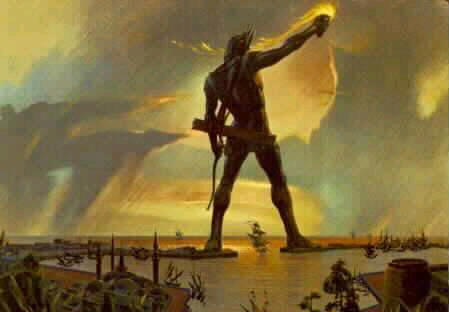 Unit 6: Chapter 3:1-30 - The
Colossus
Unit 6: Chapter 3:1-30 - The
Colossus